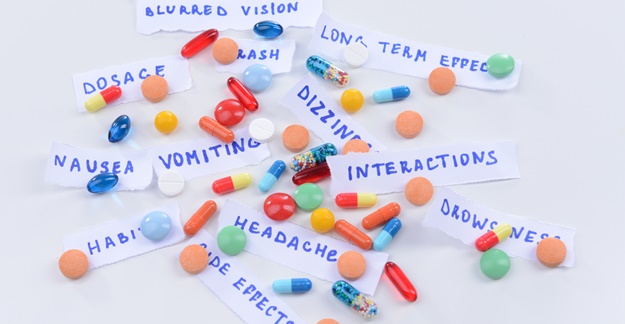When people are on multiple medications, it’s difficult to know what adverse events can occur. An experimental system called Decagon could change that.
Marinka Zitnik is a postdoctoral computer science researcher at Stanford University with an interest in how artificial intelligence (AI) can help in the field of medicine. When she came across statistics about how taking multiple medications can lead to experiencing many side effects, she decided to do something about it.
She wondered if an AI system could mine information about these drug combinations and predict their potential side effects, which could then be used by prescribers as a tool to evaluate the risks of prescribing a particular cocktail of drugs.
The more drugs someone is taking, the more likely the risk of drug-drug interactions. Physicians prescribing the drugs cannot predict all the possible side effects that could occur because there is so much that is unknown about potential adverse effects from combining drugs.
The Problem of Polypharmacy
In the US, studies show that about 40% of adults over the age of 65 take five or more medicines, up from about 13% back in the late 1980s. Called polypharmacy, it’s most common among seniors, but is also prevalent among adults with intellectual disability and, increasingly, even among children and teens with certain conditions.
Zitnik learned that it’s difficult to perform experiments on a large scale to get reliable information on potential side effects from drug combinations, given there are more than 5,000 drugs on the US market, which makes it impossible to test different combinations of all these drugs.
Zitnik and her Stanford colleagues say that there are 1,000 known drug side effects, meaning there are 125 billion possible side effects if all potential drug pairs are considered.
“We don’t know much about how they interact, and we spend nearly $200 billion on treating the side effects,” she said, quoting a Journal of Pharmacy study.
When Zitnik and her colleagues embarked on this project, they found there was no existing model that could test for polypharmacy side effects. So they took data from the FDA Adverse Event Reporting System (FAERS) database and used it to develop algorithms. Their AI system, Decagon, first learns about side effects, becoming familiar with them. It then can predict them by studying how the drugs interact with the body’s 19,000 proteins.
“We get the adverse effects data, then training [of the system] happens in several rounds. In every round, the model makes predictions, we look at errors in the predictions and we change” information about the drugs and side effects “so that in the next round the predictions are more accurate,” Zitnik explained. “This is repeated many times until the model learns…well and can accurately predict side effects.”
It currently has about 80% accuracy in predicting side effects, which it ranks according to the top 50 possible drug interactions. The researchers’ goal at this stage is to clinically validate the predictions made by Decagon, by looking for real-life patient experiences that are comparable. The next step will be refining the system and making it user friendly for prescribers.
AI’s Potential Impact on Reducing Side Effects
“I don’t see how most prescribers can even begin to scratch the surface in understanding the potential for drug interactions,” said Dave Walker, RPh, a pharmacy veteran in Oregon who used to manage pharmacies for hospitals and grocery chains and owned his own store. “Deprescribing needs to happen, because less is better. I’ve seen people taking 18, even 27 medications from multiple prescribers.”
He said the Decagon system could have a significant impact on predicting and reducing adverse effects, for one main reason.
“In pharmacology and pharmacy, they don’t have the resources or time to analyze this for every patient. If we have an automated system doing this, I see a lot of good coming from it,” Walker, who also serves on MedShadow’s Medical Advisory Board, said.
Jeannene Strianse, PharmD, director of pharmacy at Stony Brook University Hospital in New York, finds Decagon to be an interesting approach to a critical problem.
“The older you get, the more drugs you are on, for various reasons,” Strianse said. “When we look at patients that are on multiple drugs, patients 65 and older tend to be on an average of 10 drugs each.”
Stony Brook Hospital has three pharmacists review drugs a patient is taking to see if any can be taken out of the mix. They also look at databases for drug-drug interactions to see if changes are necessary. In this way, they can stop using secondary drugs that are often used to treat the side effects from particular drug combinations.
“Drugs seem to be the quick answer to things,” she pointed out. “The AI system can help patients and physicians make informed decisions in starting a new drug, but they need to be careful because it’s an idea of what might potentially happen — which may not happen.”
She cautioned that side effects often occur only in a small number of people, depending on genetic and other factors, so in a doctor-patient discussion, it needs to be discussed as “it may happen, but probably won’t happen.”
Strianse said that the system can have a lot of potential to improve care once it’s further validated, and will be one more tool in the physician’s tool box to determine what the risk is in prescribing a specific drug to a patient.
“This system will be able to say, based on how two drugs interact, that it could cause liver failure, but it can’t say if that will happen to you, me or someone else,” Strianse said. “It can just tell you there’s a potential risk, so that’s what the physician and patient need to understand — that it can’t predict exact risk, but it’s still more information than they had before.”
What’s Next for Decagon
Zitnik’s team is now collaborating with medical schools at Columbia University and Stanford to improve the model and test it so it’s accurate enough to be used in the real world.
The medical schools will look at electronic health records to see what drugs patients are on, the side effects they experience, and how that coincides with Decagon’s predictions.
“If Decagon predicts that a blood pressure lowering drug and another drug could lead to tachycardia [rapid heartbeat], they will see if there are patients who have experienced this, which then validates our system,” Zitnik said.
What she hopes to achieve with Decagon is to create user-friendly tools that provide guidance for doctors to help them make better decisions in prescribing drug combinations. Patients should also be able to enter the drug combinations they’re taking so Decagon can predict the side effects they should watch out for. Zitnik also wants to make it useful for clinical researchers, so they can develop drug therapies that have fewer side effects.






